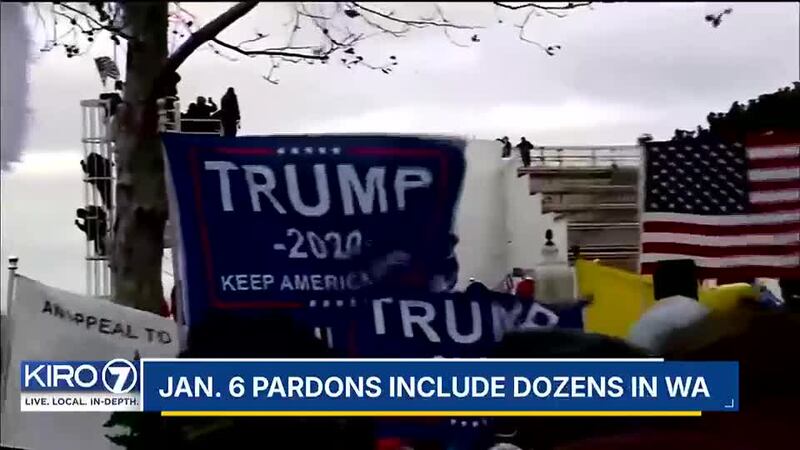President Donald Trump has pardoned roughly 1,500 people who were charged or convicted of crimes stemming from the January 6 riot at the U.S. Capitol.
Thirty of them have ties to Washington, according to MyNorthwest.
KIRO 7 spoke to one of them, Taylor James Johnatakis, who found out about his pardon while watching television from a federal prison.
“I’m free,” he said. “Feels good to be free.”
He was sentenced to more than seven years in prison after he was found guilty of seven charges, including three felonies.
Prosecutors say he “organized and coordinated other rioters to assault the police line” before grabbing the “bike racks in front of them and (pushing) them forcibly into the line of police officers.”
“I was not trying to push the bike rack into them,” Johnatakis told KIRO 7. “I was trying to scoot it as an act of civil disobedience.”
KIRO 7 asked him if he regretted going to the capitol and taking part in the events of January 6.
“It’s a tricky question, right?” he said. “If you’d have told me, ‘Hey, before you get on the plane, if you go there, you’re going to go to federal prison.’ Well, sure, I wouldn’t have got on the plane. But I didn’t go there to commit violence. I didn’t go there to assault anybody. I went there because I had genuine feelings about what happened in 2020 with regards to the election.”
Johnatakis claims no affiliation to any political, extremist or militia group, though several of the individuals pardoned by Trump are linked to such organizations.
Ethan Nordean, an Auburn resident and former leader of the extremist group Proud Boys, had his sentence commuted. He had been serving 18 years.
“Those people who have spent some time behind bars are now martyrs for the movement,” said sociologist Dr. Randall Blazak, an expert on extremism who is now working with CURE: PNW, an organization that aims to reduce hate and violence throughout the Pacific Northwest.
Blazak says the arrests tied to January 6 initially dampened the anti-government movement by highlighting the consequences of the actions. These pardons, he said, have changed that.
“Those folks have now, through these pardons, been given a green light to go ahead, join the movement, engage in the activism,” Blazak said. “The floodgates are now open for those people to come back in.”
The move could have sweeping consequences, Blazak said.
“We’ve essentially, with one stroke of a pen, normalized targeting elected officials as businesses as usual,” he said.
As for those receiving pardons, now on the journey home, their futures may still be uncertain.
“I’m just trying to put my life back together,” Johnatakis said. “I mean, everything’s been taken.”
Johnatakis is not sure exactly what will come next for his family, but he hopes to help further an organization his wife started while he was behind bars.
Left Behind and Without provides financial support for kids with incarcerated parents so they can take part in extracurricular activities.
“We’re trying to find some meaning and purpose in all of this,” he said.
©2025 Cox Media Group








